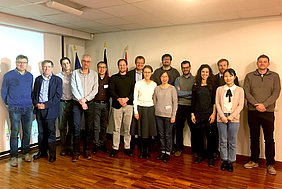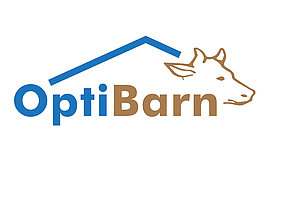Nov. 10, 2017: Partners of the transnational Optibarn project came together in Brussels for a final project meeting to discuss latest research results and to substantiate future scientific cooperation. The meeting took place on 8 and 9 November 2017 at the representation of the State of Brandenburg in Brussels.
OptiBarn (Optimised animal specific barn climatisation facing temperature rise and increased climate variability) is a European research project with the aim to develop regional, sustainable adaptation strategies for dairy cow husbandry. Since 2014 scientists from seven research institutes in Germany, Danmark, Spain, Israel and Australia have jointly developed solutions for optimizing the climate in open ventilated dairy barns. From the beginning, decision makers and industry partners were integrated into the project work in order to have the practice demands in view and to promote the transfer of results from research into the practice of animal husbandry.
Scientists also addressed the question of how the heat stress caused by the increasingly occurring extreme weather conditions affects the vitality of dairy cattle. The investigations focused on climate situations in Northern Europe, Atlantic Western Europe and two Mediterranean regions.
Results of the intensive joint work are innovative concepts for the construction and ventilisation of stables in adaptation to the changing climatic conditions.
"We know that temperatures above 25°C cause severe physiological stress for the animals. Our goal was and is a 'smart stable' in which ventilation and cooling equipment are automatically controlled on the basis of the relationship between current weather data and the expected heat-related stress load on the animals", describes ATB scientist Prof. Dr. Thomas Amon the research challenge. "But there is still a lot to do before cows can move into the first climate-adapted ,smart barn'."
As a first step towards this goal, an app is currently under development that will be able to predict to farmers the expected physiological load on their dairy cattle on basis of current weather data and animal-specific parameters. These relationships are dependent on region and genotype.
In the context of collaborative project work, the Optibarn partners have consolidated and expanded their network. "In Optibarn, we were very intensively and fruitfully doing basic research and will certainly continue the collaboration with our partners beyond the funding period for Optibarn. There are already concrete project concepts also with other partners such as the University Wageningen that will bring us closer to our common goal of animal welfare in the context of climate-adapted dairy cattle farming, "says Prof. Amon.
Research partners in the project are the universities in Aarhus (DK) and Valencia (E), as well as the non-university institutes PIK (D), ARO (IL), Basque Center For Climate Change (E), and as associate the University of Queensland (AU).
Scientific contributions at international conferences presented first results, a. o. at the RAMIRAN 2015/Hamburg, D; Precision Dairy Farming Conference 2016/Leuwaarden, NL; MACSUR Science Conference 2017/Berlin, D; ECCA 2017/Glasgow, UK; EAAP 2017/Tallinn, EE; BTU 2017/Stuttgart, D. Numerous scientific articles with detailed results will be published shortly. The final report for the Optibarn project will be prepared by March.
The transnational project Optibarn (Optimised animal specific barn climatisation facing temperature rise and increased climate variability) is funded within the framework of the FACCE ERA-NET Plus Initiative „Climate Smart Agriculture“ of the Seventh Framework Program (FP7) of the European Commission. Under the ERA-NET Plus action “Climate Smart Agriculture: Adaptation of agricultural systems in Europe” research addresses adaptation of European agriculture to climate change in its broad sense. FACCE-ERA-NET Plus has received funding from the European Union’s Seventh Framework Programme for research, technological development and demonstration under grant agreement no 618105. The funding of the individual project partners is granted by national contact points.


